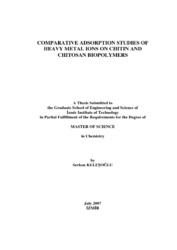Please use this identifier to cite or link to this item:
https://hdl.handle.net/11147/3365Full metadata record
| DC Field | Value | Language |
|---|---|---|
| dc.contributor.advisor | Polat, Hürriyet | - |
| dc.contributor.author | Keleşoğlu, Serkan | - |
| dc.date.accessioned | 2014-07-22T13:51:23Z | |
| dc.date.available | 2014-07-22T13:51:23Z | |
| dc.date.issued | 2007 | - |
| dc.identifier.uri | http://hdl.handle.net/11147/3365 | - |
| dc.description | Thesis (Master)--İzmir Institute of Technology, Chemistry, İzmir, 2007 | en_US |
| dc.description | Includes bibliographical references (leaves: 126-138) | en_US |
| dc.description | Text in English; Abstract: Turkish and English | en_US |
| dc.description | xv, 138 leaves | en_US |
| dc.description.abstract | In this study comparative adsorption studies of heavy metal ions (Cu2+, Pb2+,Cd2+, Ni2+) on chitin and chitosan biopolymers were performed to investigate the uptake performances. For this purpose chitosan was prepared from chitin in controlled experimental conditions and then these biopolymers were characterized with Elemental Analysis, Viscosity, FT-IR, Potentiometric Titration, XRD, SEM, Zeta Potential,Particle Size Distribution and TGA/DTA measurements. Batch adsorption experiments were performed at eight different initial heavy metal ion concentrations (10, 25, 50, 100, 250, 500, 750, 1000 m/L), two different temperatures (298.15 K and 328.15 K), time period ranging from 5 minutes to 1 day and pH of solutions ranging from 1 to 7. The results indicated that the uptake performence of chitin and chitosan biopolymer significantly changed with pH, adsorbent dosage,concentration and temperature. In general, chitosan biopolymer demonstrated greater fixation abbility for heavy metal ions than chitin. However the fixation trend of heavy metal ions on chitin and chitosan biopolymers was the same (Cu2+ > Pb2+ > Cd2+ > Ni2+). Moreover Irwing-Williams Series support the dominancy of the binding mechanism for Cu2+, Cd2+ and Ni2+ ions on both biopolymers. Adsorption of heavy metal ions on both chitin and chitosan biopolymers followed pseudo second order kinetics with the rate constant indicating faster adsorption on chitin for Cu2+ and Pb2+ ions and faster adsorption on chitosan for Cd2+ and Ni2+ ions.Both of the Freundlich and Langmuir adsorption isotherms seem to adequately represent the adsorption data obtained in this study. The positive value of enthalpy change (Ho) and negative value of free energy change (Go) shows the adsorption process is endothermic and spontaneous. Moreover obtained positive entropy changes (So) show that an increase in randomness, is associating the adsorption of metal ions onto chitin and chitosan biopolymers. | en_US |
| dc.language.iso | en | en_US |
| dc.publisher | İzmir Institute of Technology | en_US |
| dc.publisher | Izmir Institute of Technology | en_US |
| dc.rights | info:eu-repo/semantics/openAccess | en_US |
| dc.subject.lcc | QD547. K29 2007 | en |
| dc.subject.lcsh | Adsorption | en |
| dc.subject.lcsh | Heavy metals--Absorption and Adsorption | en |
| dc.subject.lcsh | Metals ions | en |
| dc.subject.lcsh | Biopolymers | en |
| dc.subject.lcsh | Chitin | en |
| dc.subject.lcsh | Chitosan | en |
| dc.title | Comparative Adsorption Studies of Heavy Metal Ions on Chitin and Chitosan Biopolymers | en_US |
| dc.type | Master Thesis | en_US |
| dc.institutionauthor | Keleşoğlu, Serkan | - |
| dc.department | Thesis (Master)--İzmir Institute of Technology, Chemistry | en_US |
| dc.relation.publicationcategory | Tez | en_US |
| dc.identifier.wosquality | N/A | - |
| dc.identifier.scopusquality | N/A | - |
| item.fulltext | With Fulltext | - |
| item.languageiso639-1 | en | - |
| item.openairecristype | http://purl.org/coar/resource_type/c_18cf | - |
| item.grantfulltext | open | - |
| item.openairetype | Master Thesis | - |
| item.cerifentitytype | Publications | - |
| Appears in Collections: | Master Degree / Yüksek Lisans Tezleri | |
Files in This Item:
| File | Description | Size | Format | |
|---|---|---|---|---|
| T000622.pdf | MasterThesis | 2.64 MB | Adobe PDF |  View/Open |
CORE Recommender
Page view(s)
456
checked on May 12, 2025
Download(s)
230
checked on May 12, 2025
Google ScholarTM
Check
Items in GCRIS Repository are protected by copyright, with all rights reserved, unless otherwise indicated.